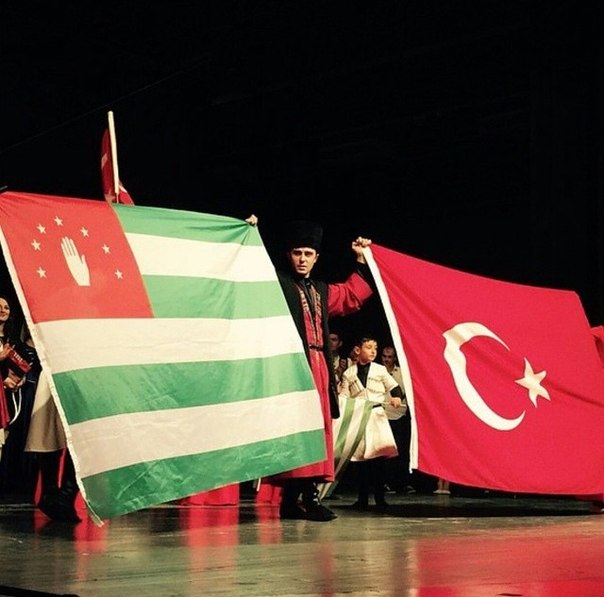
Abkhazia’s Attempts to Bring Expatriates Home Hit Major Obstacles
Publication: Eurasia Daily Monitor Volume: 13 Issue: 52
By:

The government of the Georgian breakaway territory of Abkhazia plans to ramp up its attempts to bring the large Abkhaz diaspora back to the republic. Currently, an estimated 3,500 Abkhaz repatriates are permanently residing in the republic and up to 8,000 have received Abkhazian passports. However, the Abkhazian government believes that the pool of possible repatriates is far larger and includes hundreds of thousands of ethnic Abkhaz who reside primarily in Turkey. According to the chairman of the Abkhazian government’s committee for repatriation, Vadim Kharazia, the republican authorities are working on a plan to increase their outreach efforts to the Abkhaz diasporas worldwide and are helping returning Abkhaz co-ethnics with housing and employment. Kharazia told the Russian government–sponsored news agency Sputnik that from February 19 through 21, he visited Turkey, where he met with Abkhaz activists who agreed to coordinate their efforts with the self-declared country’s government. The budget for the repatriation comes from a special 2 percent tax on the salaries of all Abkhazian citizens. In 2016, the budget for repatriation is expected to reach a record $2 million (Sputnik-abkhazia.ru, February 29).
Ethnic Abkhaz are culturally close to the Circassians, but they historically lived in the southern Caucasus, unlike the Circassians, who resided primarily in the North Caucasus. When Russia conquered the Caucasus in the 19th century, the tsarist government deported ethnic Abkhaz from Abkhazia along with the Circassians. Thus, there is a large Abkhaz diaspora in Turkey and elsewhere in the Middle East. At the same time, ethnic Abkhaz are a relatively small group in Abkhazia itself. When the last Soviet census was conducted in 1989, ethnic Abkhaz made up less than one-fifth of the population of the republic—about 93,000 out of 525,000 people. Ethnic Georgians made up about 46 percent of Abkhazia’s total population and were the largest ethnic group in the republic. Ethnic Armenians and ethnic Russians made up another 15 percent and 14 percent, respectively, of the total population of Abkhazia. Since then the demographic situation in Abkhazia has dramatically changed. During the Abkhaz-Georgian war of 1992–1993, Abkhaz irregulars, with Russia’s tacit and explicit support, expelled the majority of ethnic Georgians from their territory. According to the 2011 census, the population of the republic was only 241,000, less than half what it was in 1989. About half of the total current population, 122,000 people, are ethnic Abkhaz (Pop-stat.mashke.org, accessed March 16).
The precarious demographic status of the Abkhaz, on the one hand, pushes them to limit immigration from Russia while, on the other hand, forcing them to seek a demographic boost, using their extensive diaspora. Abkhazia is heavily dependent on Russia for both its security and economic well-being, yet repeated attempts by Russian officials to make it easier for Russian citizens to acquire real estate in Abkhazia have failed so far, although illicit trade is going on despite government regulation (Sputnik-abkhazia.ru, August 8, 2015).
The Abkhazian government’s attempts to boost the population of ethnic Abkhaz through repatriation have so far yielded relatively modest results. Given the rocky relations between Abkhazia’s backer, Russia, and Turkey, where the bulk of the Abkhaz diaspora resides, it is hard to see how the repatriation program will work in the near term. The Abkhazian government supported Russian economic sanctions against Turkey, following the downing of the Russian warplane on the border between Turkey and Syria (Abkhazinform.com, January 12). The government in Sukhumi supported these sanctions even though the impoverished republic quite substantially depends on Turkish investments and imported goods. It appears that Moscow can easily force Abkhazia to act counter to its interests—despite the fact that, formally, Abkhazia acts as if it is an independent country, recognized first and foremost by Russia itself.
Even before the Russian-Turkish dispute, the Abkhaz were quite wary of inviting their ethnic kin back to their homeland. One of these reasons is religion. The majority of the Abkhaz who reside in Abkhazia are Christian Orthodox while the repatriates are mostly Muslim. This creates substantial tensions in the republic, where there is not a single functioning mosque even though about 16 percent of the population of Abkhazia is Muslim. The other obstacle that prevents the mass return of ethnic Abkhaz to the territory is its weak economy and the bleak prospects for its residents. An estimated 1,700 ethnic Abkhaz lived in Syria prior to the start of the war there (Onkavkaz.com, March 5). About 540 of them have been repatriated to Abkhazia since the war in Syria began, but about 150 of them later left Abkhazia. Some of the Syrian Abkhaz left for Europe, others for the Russian North Caucasus, while some even returned to Syria (Sputnik-abkhazia.ru, February 29).
The experience of Abkhaz repatriation also has lessons for the Circassians. Despite all the obstacles the Abkhaz face in repatriating their ethnic kin from the Middle East, they still have more freedom to do so than the Circassians. Although it is hard to call Abkhazia a sovereign nation, given how much the separatist republic depends on Russia, it is still able to provide much better for its repatriates than the Circassians who reside in the North Caucasus. This contrast is likely to affect the thinking of the Circassians about their own program of repatriation, especially if the Abkhazian government eventually succeeds in attracting a larger pool of repatriates.




